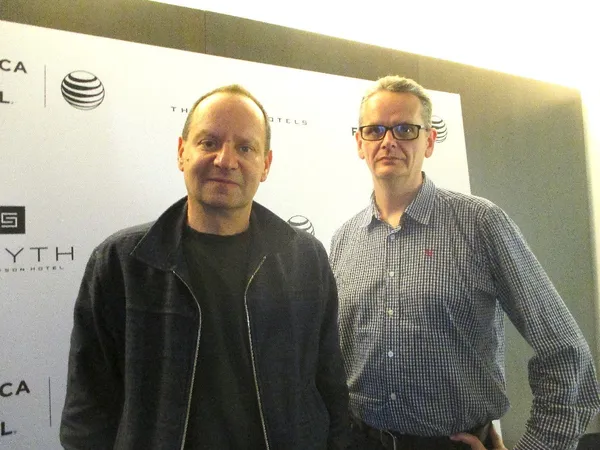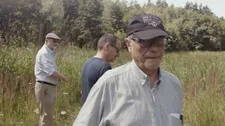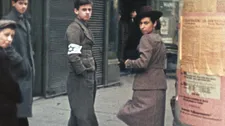 |
| A Nazi Legacy: What Our Fathers Did screenwriter Philippe Sands with director David Evans Photo: Anne-Katrin Titze |
David Evans' riveting dive into the personal and historical past of three families is accompanied by private photographs and previously unseen home movies provided by two sons, Niklas Frank and Horst von Wächter, both born in the spring of 1939.
My Nazi Legacy (What Our Fathers Did: A Nazi Legacy) had its world premiere at the Tribeca Film Festival and I met up with director David Evans and screenwriter Philippe Sands for a conversation at high noon. It led us to Leonardo Da Vinci's Lady With An Ermine, First Chief Prosecutor of the International Criminal Court, Luis Moreno Ocampo, Friedensreich Hundertwasser and Steven Spielberg's red in Schindler's List.
Human rights lawyer and author Philippe Sands, who lost ancestors in the Holocaust, is at the centre of the documentary's extraordinary constellation. Going on 70 years after the end of the Second World War and the beginning of the Nuremberg Trials, Sands travels with Frank and von Wächter, as they head East to look or squint at places significant to their families' narrative.
 |
| Niklas Frank, Philippe Sands and Horst von Wächter near Zhovkva: "There is a sense that Horst can accurately claim that Nik's hatred is based on the personal ground, not on a moral one." |
Niklas is the son of Hans Frank, a member of the NSDAP before it even existed, who rose from being Adolf Hitler's personal legal adviser and Minister of Justice for Bavaria, to eventually become Governor-General of the occupied Polish territories in 1939.
Niklas Frank, on camera, when he speaks about his fighting parents - his mother Brigitte, the "Queen of Poland," who went "fur shopping" in the Kraków ghetto - has hatred for them glistening in his eyes.
Anne-Katrin Titze: After seeing your film I thought of Tolstoy's beginning of Anna Karenina: "All happy families are alike - every unhappy family is unhappy in its own way." Was that something you thought about after you saw where the project was heading?
David Evans: One thing that I would say we learned in making the film - which was absolutely not part of our project going into the film - is that the experience of one's family in infancy can eclipse more or less anything that had been perpetrated by any member of the family. By eclipse, that doesn't necessarily mean it erases it, but it makes it very difficult to have a view of it. It's obscured, certainly for Niklas [Frank], you can't quite credit the clarity of his assessment of his father because you can see this hatred, this personal hatred looming in-between Niklas as an adult and the record of his father's actions. You can see that in between those things there's this massive personal animus against his father which has nothing to do … His father could have been a small town lawyer in Germany and Nik would still have hated him just as much. I'm not sure if that quite puts it on the Tolstoyan plane.
AKT: Maybe more on the Jesuit plane - give me the boy until he is seven...
David Evans: That's right.
Horst von Wächter is the son of Baron Otto von Wächter, head of the Civil Administration in the Kraków and Galicia districts in the General Government, directly under the supervision of Hans Frank. Von Wächter was Governor of Kraków from 1939 to 1941 and his son's memories of that time sound like paradise.
David Evans: Another serendipitous thing about the film is that we couldn't have predicted quite how much Horst [von Wächter] with his own excessive … the way he idolises his own infancy to the extent of conjuring up his family as if they were somehow a perfect family, an impossibly perfect family - one thing we couldn't have predicted is how that qualifies Horst to be the perfect interrogator of Nik's position which seems unassailable to begin with. Who possibly is going to resent a man hating his father when his father's been responsible for the murder of millions of people? Who could possibly deny a son the right to hate his father for that? Yet, Horst's perspective is accurate. There is a sense that Horst can accurately claim that Nik's hatred is based on the personal ground, not on a moral one.
 |
| Kraków Ghetto, circa 1940 Photo: courtesy of Niklas Frank |
AKT: The film comes at a time when the last survivors are dying and what we have are the memories of the sons and the grandchildren…
David Evans: That's not quite true - speaking as somebody who has known Philippe since University days but I'd never had anything to do with law. I've worked in the arts, if you like, my entire adult life. For me, just on a personal level, it made me much more understanding of the historical purpose of legal institutions. Of course, in a social sphere, the only thing we have left are stories about stories. And as that period passes beyond living memory we're going to be left with documents like ours. Increasingly we are, not exclusively. Actually because of the Nuremberg Trials, because of things like that, there is actually a more dispassionate record put in place by the facts of these verdicts that go down throughout history.
For me that was one of the more intellectually interesting parts of doing this project. To realise how important, more or less what Philippe says at the end of the voice-over towards the end of the film is - that there is a reason that you have courts, which is, albeit that it's imperfect, these verdicts, it is better than that these men had just been shot because they were the losers.
AKT: I spoke last fall with Luis Moreno Ocampo on the importance of storytelling becoming witnessing. How silence does not aid the victims, only the criminals.
Philippe Sands: I know Luis very well. We are good friends. One of the things that emerges in this story which is interesting for me is that there are also unintended consequences. So you have a trial for one person and no trial for another person and it creates a space in which that second person's son can say "he was never convicted!"
AKT: Yes, that's what you have in your film with Horst's insistence.
Philippe Sands: So it feeds the imperfections. This film could have been made in Yugoslavia, it could have been made in Congo, it could have been made in Libya right now, or Iraq and we could have found… I mean it's rare, I think, to find someone like Horst who is willing to speak in that way. That is for me the uniqueness of the film. But I think there are a lot of Horsts in Austria, and in Germany and in Britain, and in Russia and in Yugoslavia and in Rwanda. But that theme, that for every Miloševic who was tried and almost convicted there'll be another Šešelj, who was not in the end convicted. And Šešelj's children will say "he was never convicted." I think it's problematic.
AKT: Your editor also worked on Orlando von Einsiedel's documentary Virunga and with Pawel Pawlikowski?
David Evans: Yes. We feel very indebted to all the people who made this film. We really missed David [Charap] at the screening yesterday because he's been such a close collaborator.
Philippe Sands: He is brilliant. That moment when Niklas is talking about going into the Kraków ghetto with his family and his mother.
AKT: Fur shopping? That is an incredible moment! He says almost nonchalantly: "My mother was going fur shopping in the ghetto." It leaves you speechless.
Philippe Sands: It was David who remembered that in the 30 minutes of home movies there was a shot of Brigitte in her fur coat. The guy is brilliant.
AKT: "I like you personally but I don't like the thoughts in your brain." [Niklas says to Horst]
David Evans, laughing: Sometimes I think the fact that they're both working in their second language is productive of this strange kind of poetry.
AKT: It's a beautiful sentence and so true. It also asks the question of where it stops. Where is the boundary to still liking someone?
Philippe Sands: At some point it stopped. By the end.
AKT: When did it stop for you? At some point you ask Niklas why he ever introduced you to Horst.
Philippe Sands: The Purcell Room scene [a public dialogue held in London] is a sort of half way journey. I tried to stay warm but my empathy is obviously in the direction of Niklas. And yet, I find myself feeling curiously protective towards Horst. Because I don't think that Horst is a bad person. I think Horst has been through a terrible trauma, which you see for yourself when he starts crying talking about his birthday now in April 1945. That was unexpected. That was the only moment he let his guard down. He cracked and started to cry. It was a very important moment for me because I understood that this was someone who had gone through a trauma who is struggling to keep everything together.
AKT: How are the two? Are they talking?
Philippe Sands: They are not talking. David, you are talking to both of them.
David Evans: Niklas and Philippe have a very close relationship. Horst liked the fact that I was always eager to make sure we have a fully three dimensional portrait of him. There were some things that I was genuinely interested to pursue with Horst that Philippe was less interested in. I was interested in the crusader history of his family, for example, and the connection to the Temple in Jerusalem and so on. I wanted to go there because I wanted to understand that side. Horst responded very positively to that because that's really where his heart is. As he says in the synagogue, as you noticed, he is not interested in 70 years ago and that can make him appear terribly brutal. It's a shame, but it's not what he thinks about. He thinks about the 300 year perspective or the 600 year perspective.
AKT: The tour he gives of his family home is terribly fascinating. And then add to the mix that he worked with Hundertwasser!
Philippe Sands: Incredible.





















